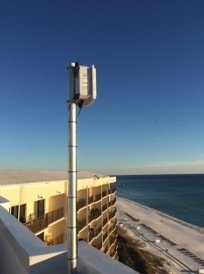Under the unique shared-spectrum licensing structure of the CBRS (Citizens Broadband Radio Service) band, a swath of 150 MHz in the 3.5 GHz range, an ESC network must be in place to sense when U.S. Navy ships are using the band. What Federated is announcing Monday is that its ESC network is ready to go, one of the final things needed before commercial customers of Federated’s products and services would be able to formally start operating their networks.
Though the Federated ESC network is still pending final FCC approval, Federated president and CEO Iyad Tarazi said in a phone interview that the company “expects to get the green light [from the FCC] in June,” with the commercial customer launches following soon behind. Federated, a pure-CBRS startup with $75 million in funding, also offers Spectrum Access Services (SAS), another part of the CBRS puzzle to help ensure that any network operators who want to play in the shared-space sandbox that is CBRS are only using spectrum chunks that are free of any higher-priority traffic.
According to Tarazi Federated already has 25 customers testing its gear and services in getting ready to launch CBRS networks, a yet-unnamed group of entities that Tarazi said includes wireless carriers, enterprise companies looking to launch private networks, and even some large public venues.
Private networks first for venues?
The early thinking on CBRS use cases for sports stadiums includes the possibility of using private LTE networks for sensitive internal operations like ticketing and concessions, or even for closed-system video streaming and push-to-talk voice support. In the longer-term future, CBRS has been touted as a potential way to provide a neutral-host network that could support fan-facing carrier offload much like a current distributed antenna system (DAS), but to get to that place will still likely require some more-advanced SIM technology to be developed and deployed in client devices like cellphones.
But the potential of a new, huge chunk of spectrum — and the possibility of teams, leagues and venues being able to own and operate their own networks — has created a wide range of interest in CBRS among sports operations. While many of those same entities already operate stadium Wi-Fi networks, CBRS’s support for the cellular LTE standard theoretically could support faster, more secure networks. However, the emerging Wi-Fi 6 standard may close the performance gaps between cellular and Wi-Fi in the near future; many networking observers now seem to agree that most venues will likely see a continued mix of Wi-Fi and cellular systems in the near future, possibly including CBRS.
Already, the PGA and NASCAR have live tests of CBRS networks underway, and the NFL and Verizon have kicked the ball around with CBRS tests, reportedly for possible sideline headset network use.
While CBRS will potentially get more interesting when the commercial deployments become public, if you’re a network geek you will be able to appreciate some of the work done by Federated to get its ESC network operational, starting with the deployments of sensors on coastal structures as varied as “biker bars and luxe beach resorts,” according to a Federated blog post.
Tarazi, who was most recently vice president of network development at Sprint, said the Federated ESC network is “triple redundant,” since losing just one sensor could render a big chunk of spectrum unusable.
“If you lose a sensor, you lose hundreds of square miles of [available] network,” Tarazi said. “That’s a big deal.”
And ensuring network availability is in part what Federated’s clients will be paying the company for, part of the puzzle that when put together will theoretically open up wireless spectrum at a much lower cost compared to purchasing licensed spectrum at auction. As one of the pick-and-shovel providers in the CBRS gold rush, Tarazi and Federated may be the only ESC game in town for a while, as the joint effort between CommScope and Google to build another ESC is not expected to be completed until later this year at the earliest.
“I feel like we’re at an inflection point now,” Tarazi said. “It feels good to be leading this wave.”







